Foundations of International Business
VerifiedAdded on 2023/03/17
|8
|1793
|63
AI Summary
This report provides an overview of the background, developing and global strategies of the Google Company and also undertakes in-depth literature review on the subject of the relationship that is shared between MNC’s and host nation states.
Contribute Materials
Your contribution can guide someone’s learning journey. Share your
documents today.
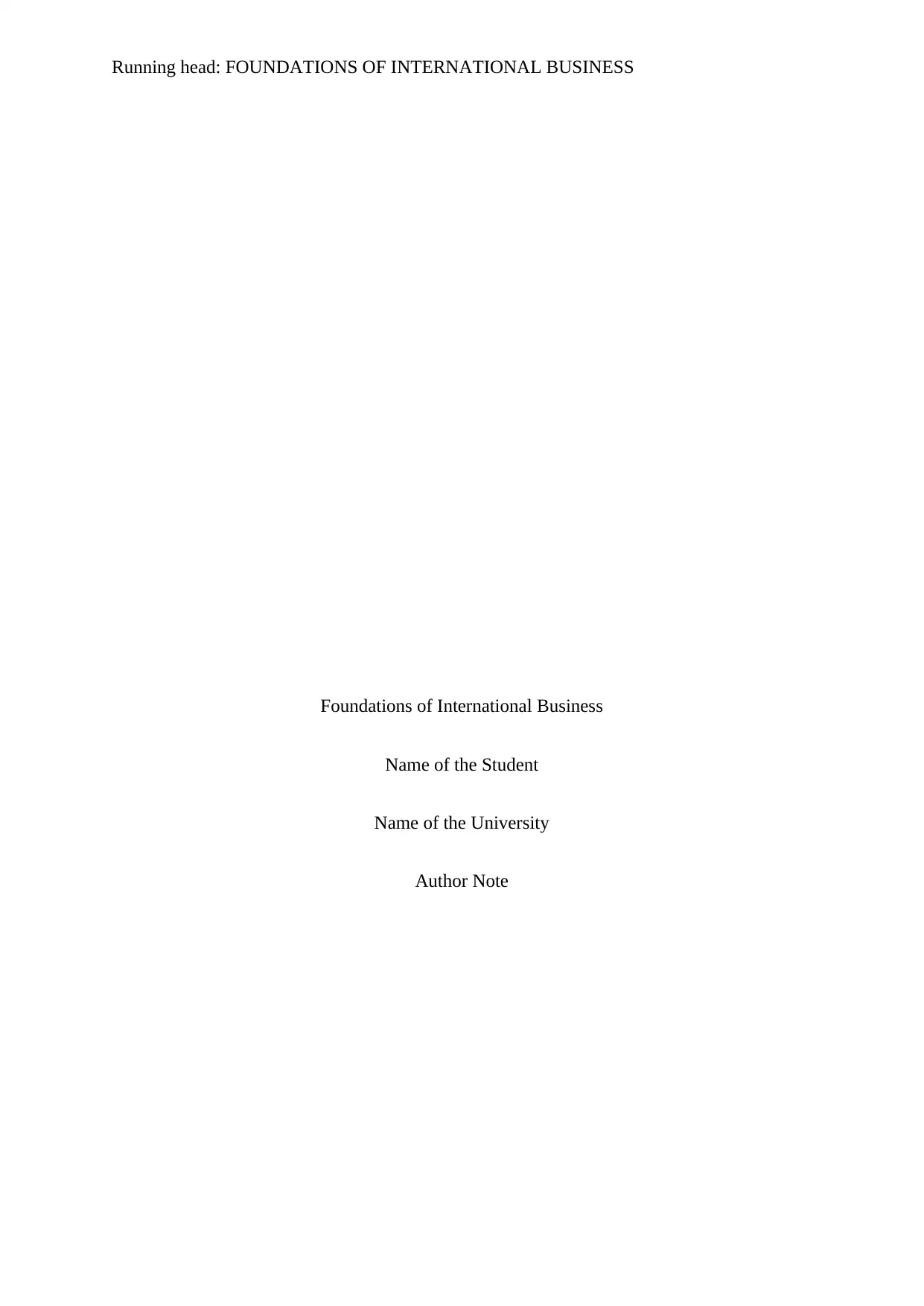
Running head: FOUNDATIONS OF INTERNATIONAL BUSINESS
Foundations of International Business
Name of the Student
Name of the University
Author Note
Foundations of International Business
Name of the Student
Name of the University
Author Note
Secure Best Marks with AI Grader
Need help grading? Try our AI Grader for instant feedback on your assignments.
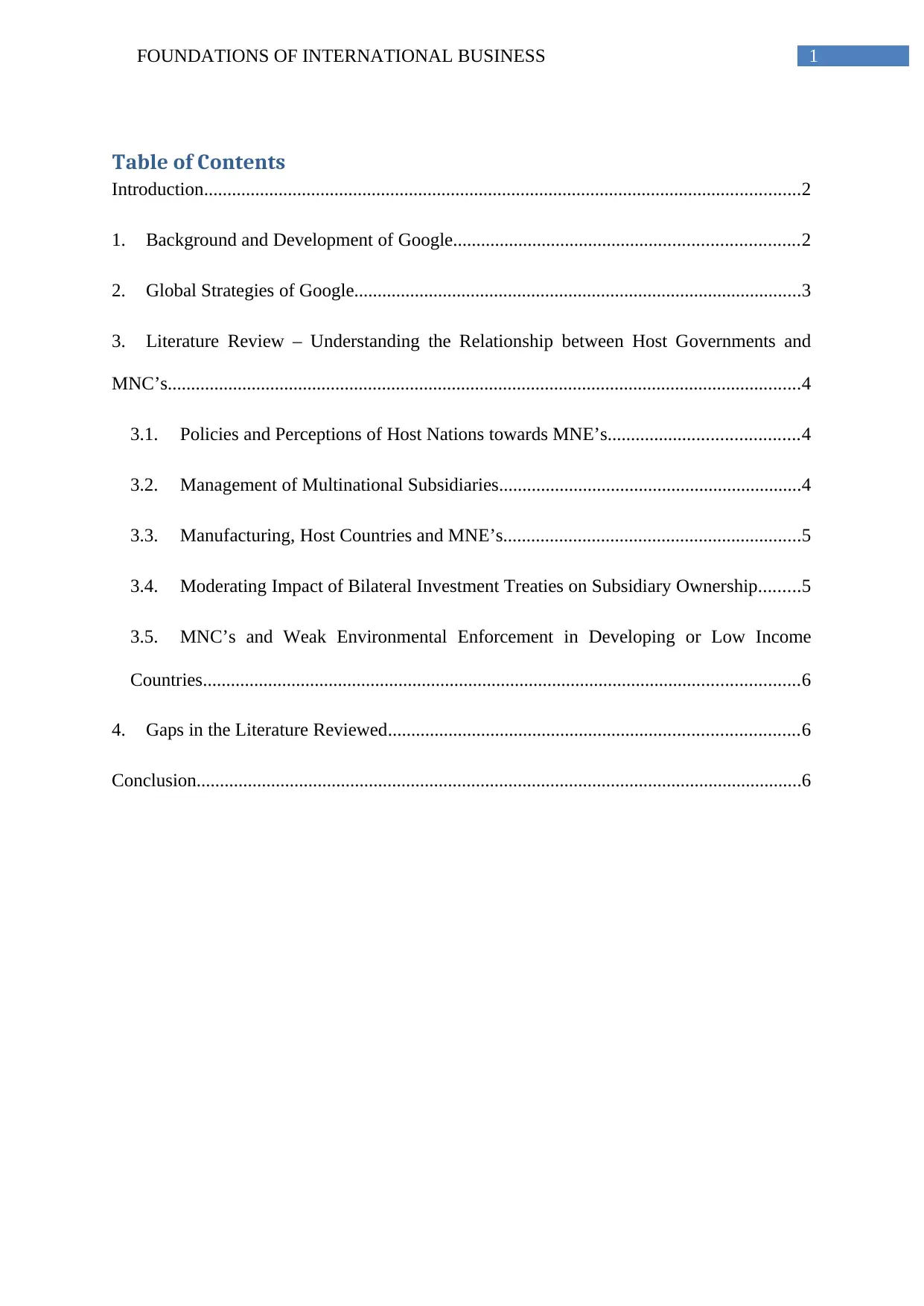
1FOUNDATIONS OF INTERNATIONAL BUSINESS
Table of Contents
Introduction................................................................................................................................2
1. Background and Development of Google..........................................................................2
2. Global Strategies of Google................................................................................................3
3. Literature Review – Understanding the Relationship between Host Governments and
MNC’s........................................................................................................................................4
3.1. Policies and Perceptions of Host Nations towards MNE’s.........................................4
3.2. Management of Multinational Subsidiaries.................................................................4
3.3. Manufacturing, Host Countries and MNE’s................................................................5
3.4. Moderating Impact of Bilateral Investment Treaties on Subsidiary Ownership.........5
3.5. MNC’s and Weak Environmental Enforcement in Developing or Low Income
Countries................................................................................................................................6
4. Gaps in the Literature Reviewed........................................................................................6
Conclusion..................................................................................................................................6
Table of Contents
Introduction................................................................................................................................2
1. Background and Development of Google..........................................................................2
2. Global Strategies of Google................................................................................................3
3. Literature Review – Understanding the Relationship between Host Governments and
MNC’s........................................................................................................................................4
3.1. Policies and Perceptions of Host Nations towards MNE’s.........................................4
3.2. Management of Multinational Subsidiaries.................................................................4
3.3. Manufacturing, Host Countries and MNE’s................................................................5
3.4. Moderating Impact of Bilateral Investment Treaties on Subsidiary Ownership.........5
3.5. MNC’s and Weak Environmental Enforcement in Developing or Low Income
Countries................................................................................................................................6
4. Gaps in the Literature Reviewed........................................................................................6
Conclusion..................................................................................................................................6
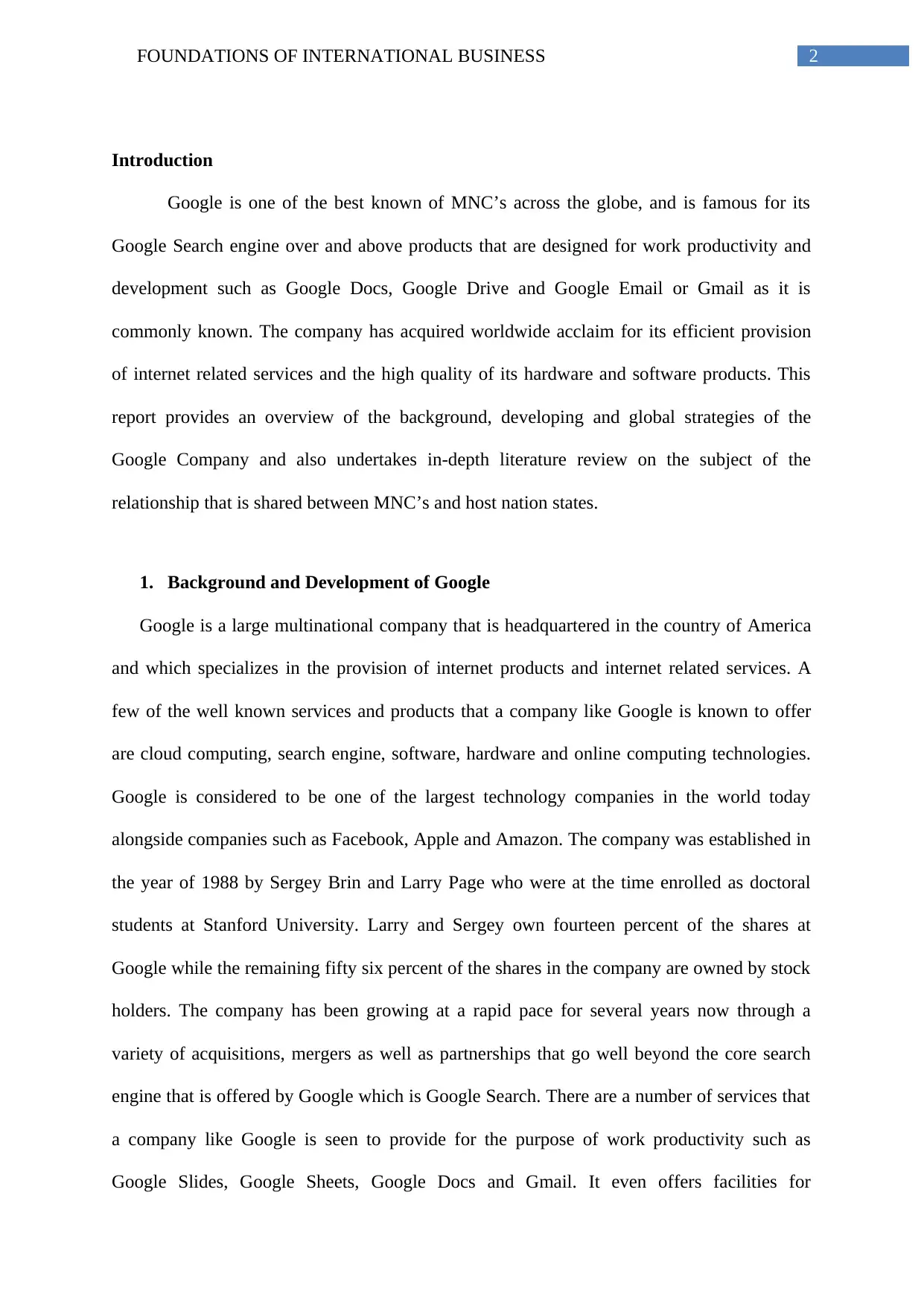
2FOUNDATIONS OF INTERNATIONAL BUSINESS
Introduction
Google is one of the best known of MNC’s across the globe, and is famous for its
Google Search engine over and above products that are designed for work productivity and
development such as Google Docs, Google Drive and Google Email or Gmail as it is
commonly known. The company has acquired worldwide acclaim for its efficient provision
of internet related services and the high quality of its hardware and software products. This
report provides an overview of the background, developing and global strategies of the
Google Company and also undertakes in-depth literature review on the subject of the
relationship that is shared between MNC’s and host nation states.
1. Background and Development of Google
Google is a large multinational company that is headquartered in the country of America
and which specializes in the provision of internet products and internet related services. A
few of the well known services and products that a company like Google is known to offer
are cloud computing, search engine, software, hardware and online computing technologies.
Google is considered to be one of the largest technology companies in the world today
alongside companies such as Facebook, Apple and Amazon. The company was established in
the year of 1988 by Sergey Brin and Larry Page who were at the time enrolled as doctoral
students at Stanford University. Larry and Sergey own fourteen percent of the shares at
Google while the remaining fifty six percent of the shares in the company are owned by stock
holders. The company has been growing at a rapid pace for several years now through a
variety of acquisitions, mergers as well as partnerships that go well beyond the core search
engine that is offered by Google which is Google Search. There are a number of services that
a company like Google is seen to provide for the purpose of work productivity such as
Google Slides, Google Sheets, Google Docs and Gmail. It even offers facilities for
Introduction
Google is one of the best known of MNC’s across the globe, and is famous for its
Google Search engine over and above products that are designed for work productivity and
development such as Google Docs, Google Drive and Google Email or Gmail as it is
commonly known. The company has acquired worldwide acclaim for its efficient provision
of internet related services and the high quality of its hardware and software products. This
report provides an overview of the background, developing and global strategies of the
Google Company and also undertakes in-depth literature review on the subject of the
relationship that is shared between MNC’s and host nation states.
1. Background and Development of Google
Google is a large multinational company that is headquartered in the country of America
and which specializes in the provision of internet products and internet related services. A
few of the well known services and products that a company like Google is known to offer
are cloud computing, search engine, software, hardware and online computing technologies.
Google is considered to be one of the largest technology companies in the world today
alongside companies such as Facebook, Apple and Amazon. The company was established in
the year of 1988 by Sergey Brin and Larry Page who were at the time enrolled as doctoral
students at Stanford University. Larry and Sergey own fourteen percent of the shares at
Google while the remaining fifty six percent of the shares in the company are owned by stock
holders. The company has been growing at a rapid pace for several years now through a
variety of acquisitions, mergers as well as partnerships that go well beyond the core search
engine that is offered by Google which is Google Search. There are a number of services that
a company like Google is seen to provide for the purpose of work productivity such as
Google Slides, Google Sheets, Google Docs and Gmail. It even offers facilities for
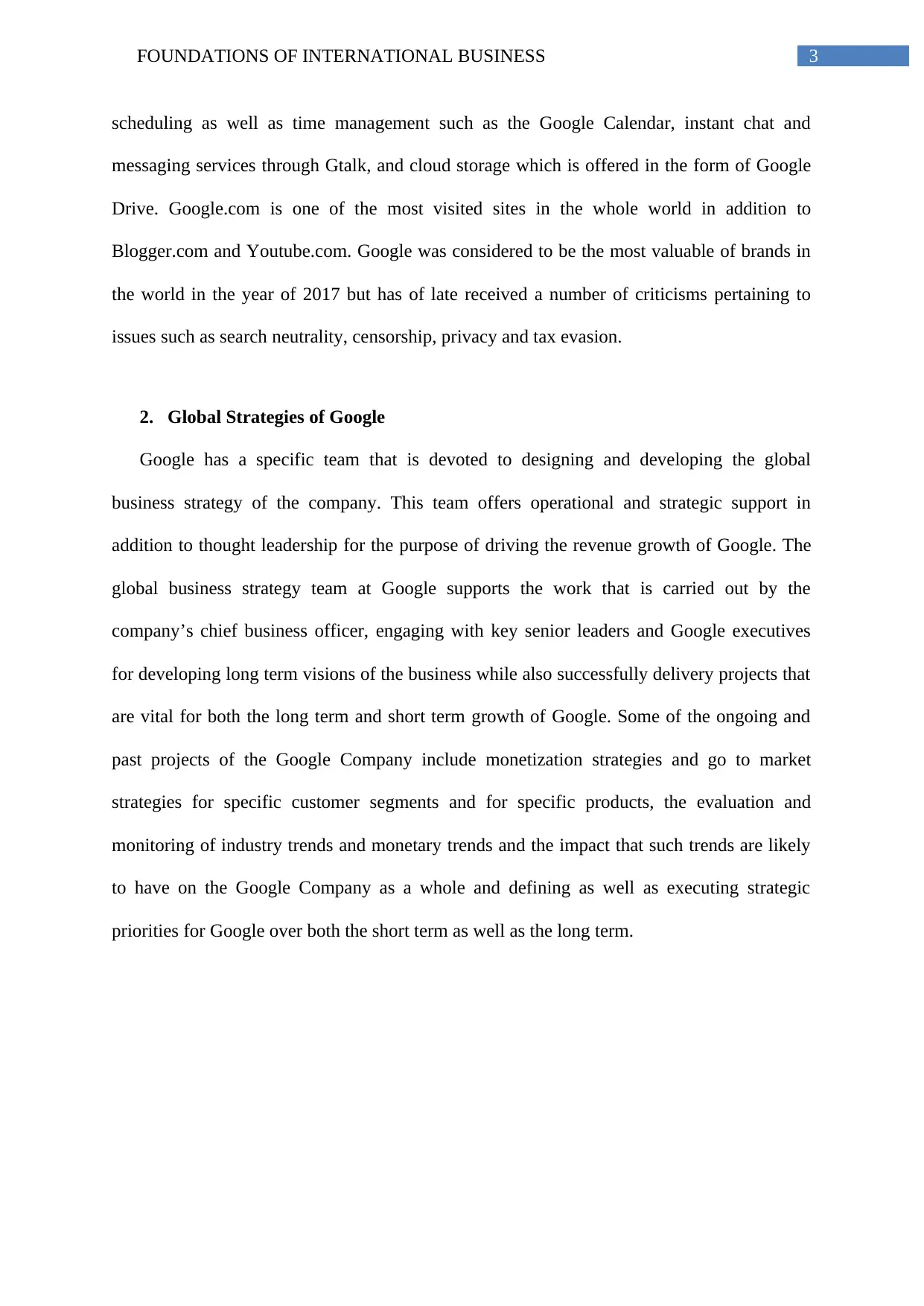
3FOUNDATIONS OF INTERNATIONAL BUSINESS
scheduling as well as time management such as the Google Calendar, instant chat and
messaging services through Gtalk, and cloud storage which is offered in the form of Google
Drive. Google.com is one of the most visited sites in the whole world in addition to
Blogger.com and Youtube.com. Google was considered to be the most valuable of brands in
the world in the year of 2017 but has of late received a number of criticisms pertaining to
issues such as search neutrality, censorship, privacy and tax evasion.
2. Global Strategies of Google
Google has a specific team that is devoted to designing and developing the global
business strategy of the company. This team offers operational and strategic support in
addition to thought leadership for the purpose of driving the revenue growth of Google. The
global business strategy team at Google supports the work that is carried out by the
company’s chief business officer, engaging with key senior leaders and Google executives
for developing long term visions of the business while also successfully delivery projects that
are vital for both the long term and short term growth of Google. Some of the ongoing and
past projects of the Google Company include monetization strategies and go to market
strategies for specific customer segments and for specific products, the evaluation and
monitoring of industry trends and monetary trends and the impact that such trends are likely
to have on the Google Company as a whole and defining as well as executing strategic
priorities for Google over both the short term as well as the long term.
scheduling as well as time management such as the Google Calendar, instant chat and
messaging services through Gtalk, and cloud storage which is offered in the form of Google
Drive. Google.com is one of the most visited sites in the whole world in addition to
Blogger.com and Youtube.com. Google was considered to be the most valuable of brands in
the world in the year of 2017 but has of late received a number of criticisms pertaining to
issues such as search neutrality, censorship, privacy and tax evasion.
2. Global Strategies of Google
Google has a specific team that is devoted to designing and developing the global
business strategy of the company. This team offers operational and strategic support in
addition to thought leadership for the purpose of driving the revenue growth of Google. The
global business strategy team at Google supports the work that is carried out by the
company’s chief business officer, engaging with key senior leaders and Google executives
for developing long term visions of the business while also successfully delivery projects that
are vital for both the long term and short term growth of Google. Some of the ongoing and
past projects of the Google Company include monetization strategies and go to market
strategies for specific customer segments and for specific products, the evaluation and
monitoring of industry trends and monetary trends and the impact that such trends are likely
to have on the Google Company as a whole and defining as well as executing strategic
priorities for Google over both the short term as well as the long term.
Secure Best Marks with AI Grader
Need help grading? Try our AI Grader for instant feedback on your assignments.
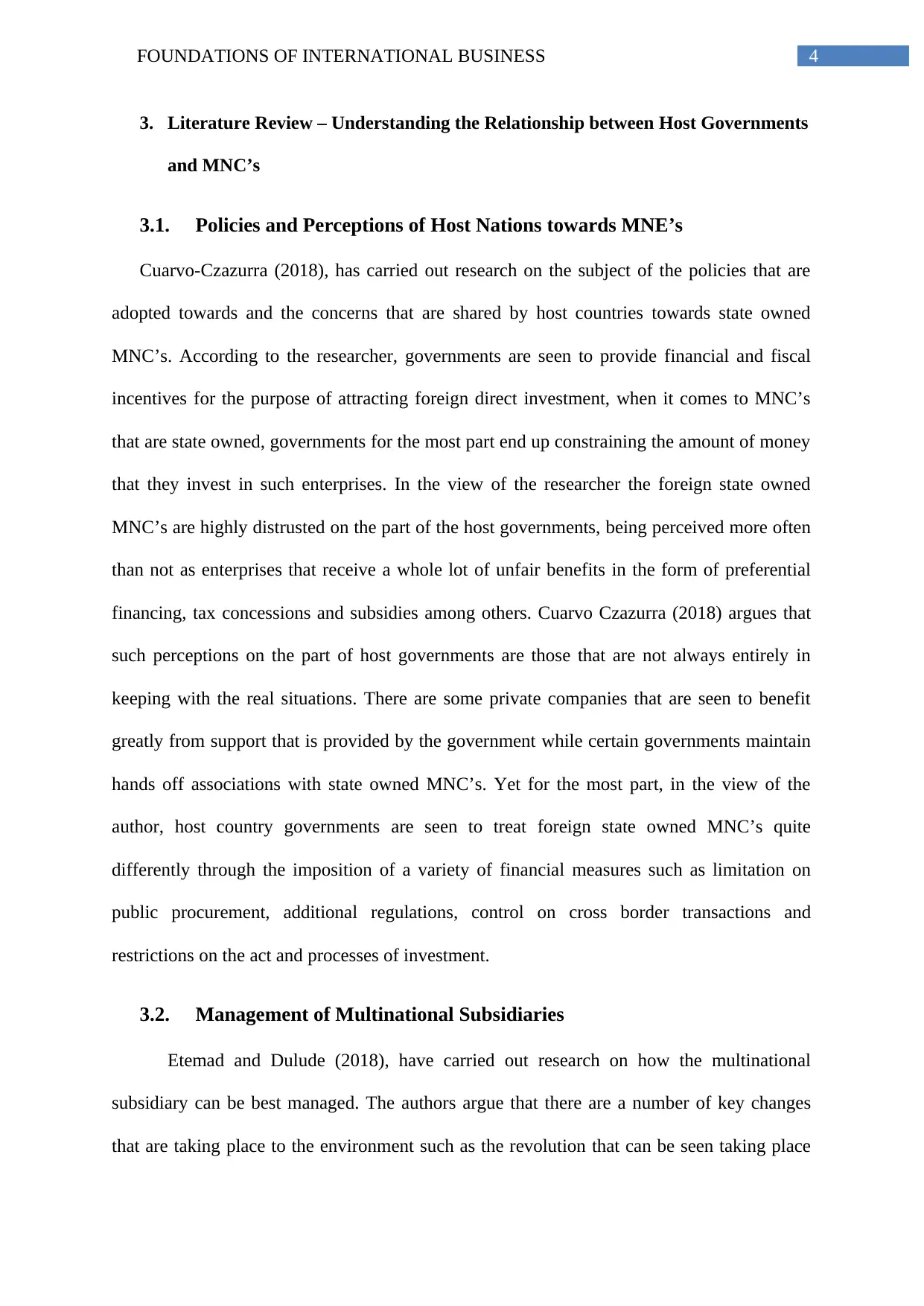
4FOUNDATIONS OF INTERNATIONAL BUSINESS
3. Literature Review – Understanding the Relationship between Host Governments
and MNC’s
3.1. Policies and Perceptions of Host Nations towards MNE’s
Cuarvo-Czazurra (2018), has carried out research on the subject of the policies that are
adopted towards and the concerns that are shared by host countries towards state owned
MNC’s. According to the researcher, governments are seen to provide financial and fiscal
incentives for the purpose of attracting foreign direct investment, when it comes to MNC’s
that are state owned, governments for the most part end up constraining the amount of money
that they invest in such enterprises. In the view of the researcher the foreign state owned
MNC’s are highly distrusted on the part of the host governments, being perceived more often
than not as enterprises that receive a whole lot of unfair benefits in the form of preferential
financing, tax concessions and subsidies among others. Cuarvo Czazurra (2018) argues that
such perceptions on the part of host governments are those that are not always entirely in
keeping with the real situations. There are some private companies that are seen to benefit
greatly from support that is provided by the government while certain governments maintain
hands off associations with state owned MNC’s. Yet for the most part, in the view of the
author, host country governments are seen to treat foreign state owned MNC’s quite
differently through the imposition of a variety of financial measures such as limitation on
public procurement, additional regulations, control on cross border transactions and
restrictions on the act and processes of investment.
3.2. Management of Multinational Subsidiaries
Etemad and Dulude (2018), have carried out research on how the multinational
subsidiary can be best managed. The authors argue that there are a number of key changes
that are taking place to the environment such as the revolution that can be seen taking place
3. Literature Review – Understanding the Relationship between Host Governments
and MNC’s
3.1. Policies and Perceptions of Host Nations towards MNE’s
Cuarvo-Czazurra (2018), has carried out research on the subject of the policies that are
adopted towards and the concerns that are shared by host countries towards state owned
MNC’s. According to the researcher, governments are seen to provide financial and fiscal
incentives for the purpose of attracting foreign direct investment, when it comes to MNC’s
that are state owned, governments for the most part end up constraining the amount of money
that they invest in such enterprises. In the view of the researcher the foreign state owned
MNC’s are highly distrusted on the part of the host governments, being perceived more often
than not as enterprises that receive a whole lot of unfair benefits in the form of preferential
financing, tax concessions and subsidies among others. Cuarvo Czazurra (2018) argues that
such perceptions on the part of host governments are those that are not always entirely in
keeping with the real situations. There are some private companies that are seen to benefit
greatly from support that is provided by the government while certain governments maintain
hands off associations with state owned MNC’s. Yet for the most part, in the view of the
author, host country governments are seen to treat foreign state owned MNC’s quite
differently through the imposition of a variety of financial measures such as limitation on
public procurement, additional regulations, control on cross border transactions and
restrictions on the act and processes of investment.
3.2. Management of Multinational Subsidiaries
Etemad and Dulude (2018), have carried out research on how the multinational
subsidiary can be best managed. The authors argue that there are a number of key changes
that are taking place to the environment such as the revolution that can be seen taking place
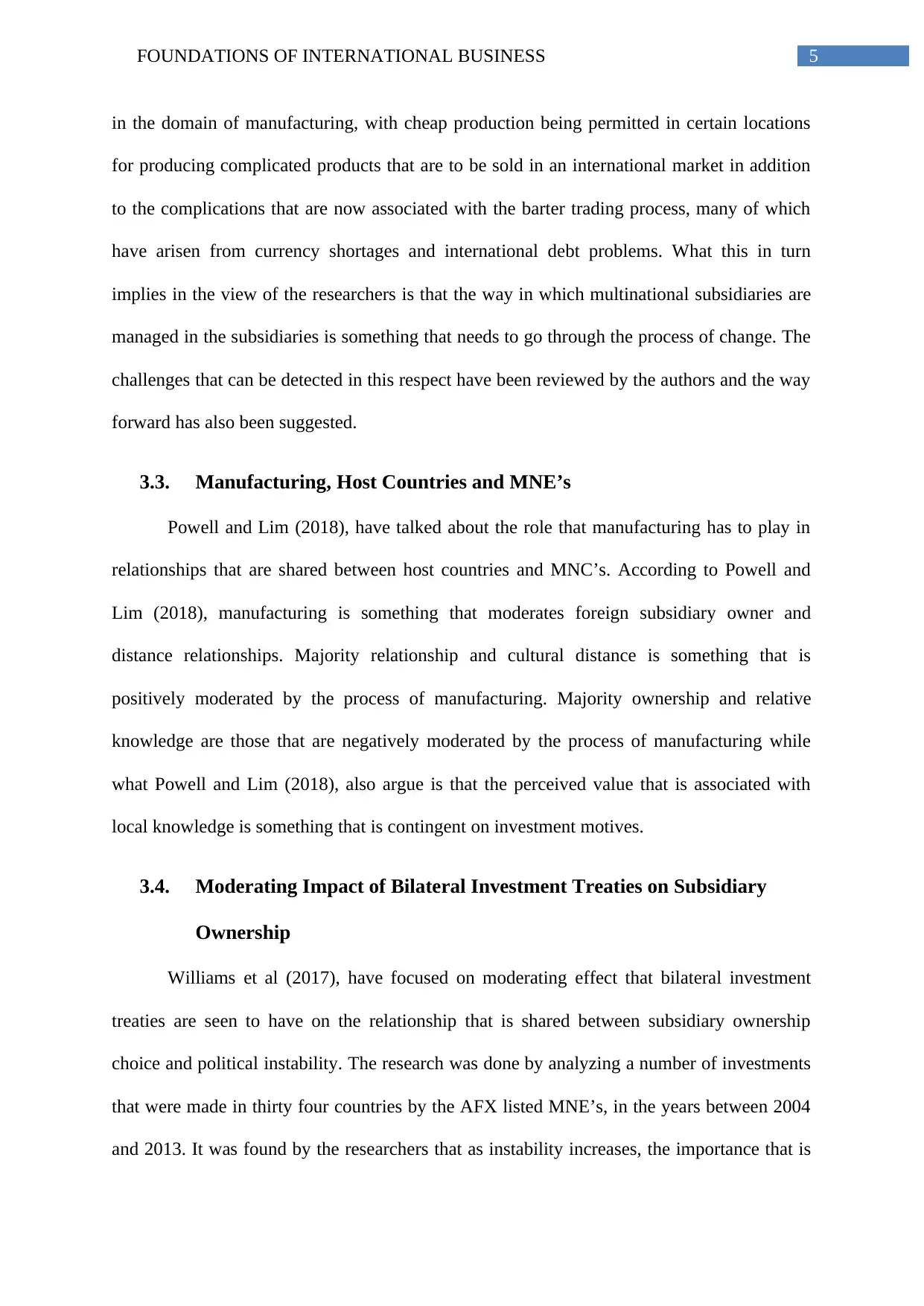
5FOUNDATIONS OF INTERNATIONAL BUSINESS
in the domain of manufacturing, with cheap production being permitted in certain locations
for producing complicated products that are to be sold in an international market in addition
to the complications that are now associated with the barter trading process, many of which
have arisen from currency shortages and international debt problems. What this in turn
implies in the view of the researchers is that the way in which multinational subsidiaries are
managed in the subsidiaries is something that needs to go through the process of change. The
challenges that can be detected in this respect have been reviewed by the authors and the way
forward has also been suggested.
3.3. Manufacturing, Host Countries and MNE’s
Powell and Lim (2018), have talked about the role that manufacturing has to play in
relationships that are shared between host countries and MNC’s. According to Powell and
Lim (2018), manufacturing is something that moderates foreign subsidiary owner and
distance relationships. Majority relationship and cultural distance is something that is
positively moderated by the process of manufacturing. Majority ownership and relative
knowledge are those that are negatively moderated by the process of manufacturing while
what Powell and Lim (2018), also argue is that the perceived value that is associated with
local knowledge is something that is contingent on investment motives.
3.4. Moderating Impact of Bilateral Investment Treaties on Subsidiary
Ownership
Williams et al (2017), have focused on moderating effect that bilateral investment
treaties are seen to have on the relationship that is shared between subsidiary ownership
choice and political instability. The research was done by analyzing a number of investments
that were made in thirty four countries by the AFX listed MNE’s, in the years between 2004
and 2013. It was found by the researchers that as instability increases, the importance that is
in the domain of manufacturing, with cheap production being permitted in certain locations
for producing complicated products that are to be sold in an international market in addition
to the complications that are now associated with the barter trading process, many of which
have arisen from currency shortages and international debt problems. What this in turn
implies in the view of the researchers is that the way in which multinational subsidiaries are
managed in the subsidiaries is something that needs to go through the process of change. The
challenges that can be detected in this respect have been reviewed by the authors and the way
forward has also been suggested.
3.3. Manufacturing, Host Countries and MNE’s
Powell and Lim (2018), have talked about the role that manufacturing has to play in
relationships that are shared between host countries and MNC’s. According to Powell and
Lim (2018), manufacturing is something that moderates foreign subsidiary owner and
distance relationships. Majority relationship and cultural distance is something that is
positively moderated by the process of manufacturing. Majority ownership and relative
knowledge are those that are negatively moderated by the process of manufacturing while
what Powell and Lim (2018), also argue is that the perceived value that is associated with
local knowledge is something that is contingent on investment motives.
3.4. Moderating Impact of Bilateral Investment Treaties on Subsidiary
Ownership
Williams et al (2017), have focused on moderating effect that bilateral investment
treaties are seen to have on the relationship that is shared between subsidiary ownership
choice and political instability. The research was done by analyzing a number of investments
that were made in thirty four countries by the AFX listed MNE’s, in the years between 2004
and 2013. It was found by the researchers that as instability increases, the importance that is
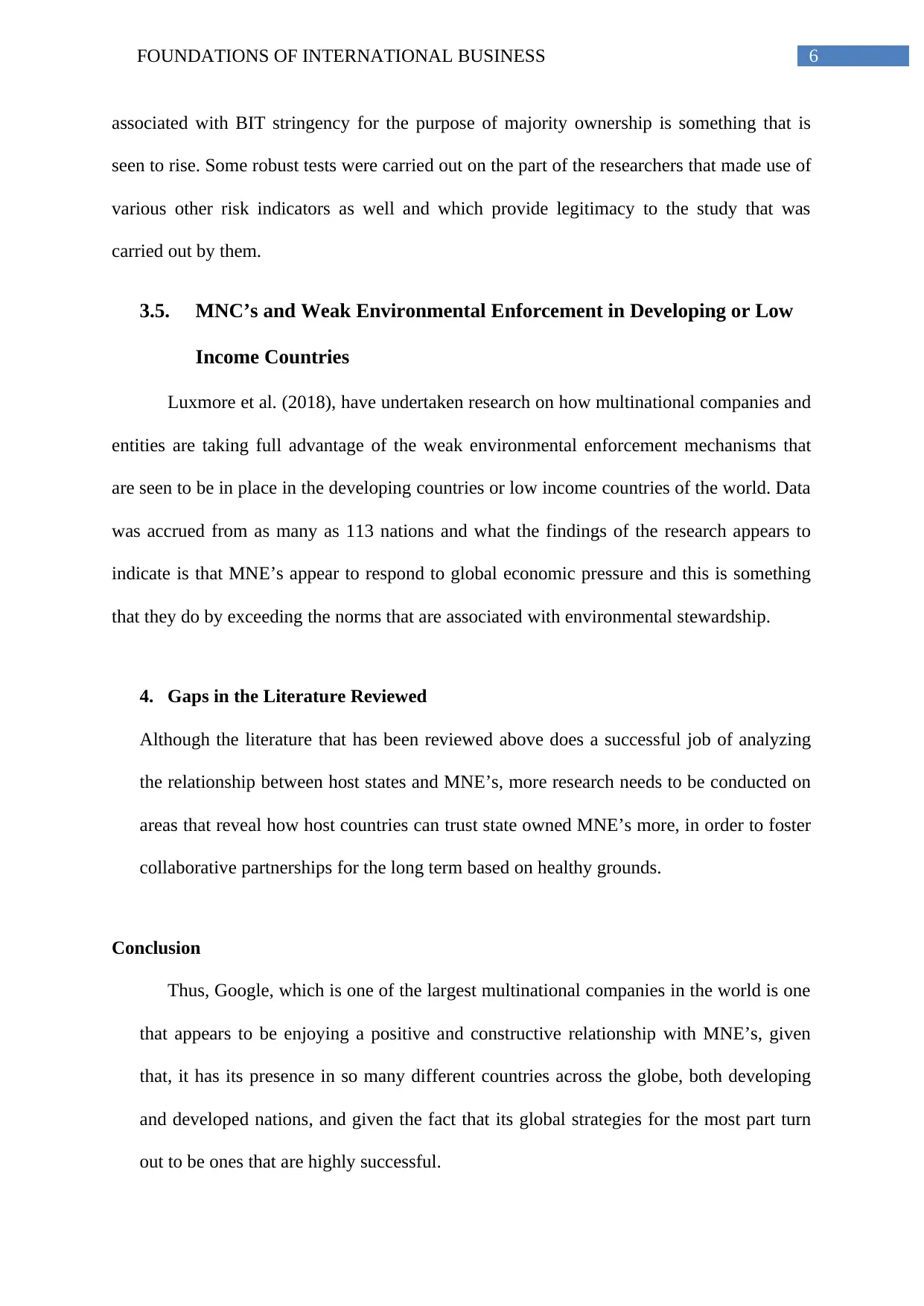
6FOUNDATIONS OF INTERNATIONAL BUSINESS
associated with BIT stringency for the purpose of majority ownership is something that is
seen to rise. Some robust tests were carried out on the part of the researchers that made use of
various other risk indicators as well and which provide legitimacy to the study that was
carried out by them.
3.5. MNC’s and Weak Environmental Enforcement in Developing or Low
Income Countries
Luxmore et al. (2018), have undertaken research on how multinational companies and
entities are taking full advantage of the weak environmental enforcement mechanisms that
are seen to be in place in the developing countries or low income countries of the world. Data
was accrued from as many as 113 nations and what the findings of the research appears to
indicate is that MNE’s appear to respond to global economic pressure and this is something
that they do by exceeding the norms that are associated with environmental stewardship.
4. Gaps in the Literature Reviewed
Although the literature that has been reviewed above does a successful job of analyzing
the relationship between host states and MNE’s, more research needs to be conducted on
areas that reveal how host countries can trust state owned MNE’s more, in order to foster
collaborative partnerships for the long term based on healthy grounds.
Conclusion
Thus, Google, which is one of the largest multinational companies in the world is one
that appears to be enjoying a positive and constructive relationship with MNE’s, given
that, it has its presence in so many different countries across the globe, both developing
and developed nations, and given the fact that its global strategies for the most part turn
out to be ones that are highly successful.
associated with BIT stringency for the purpose of majority ownership is something that is
seen to rise. Some robust tests were carried out on the part of the researchers that made use of
various other risk indicators as well and which provide legitimacy to the study that was
carried out by them.
3.5. MNC’s and Weak Environmental Enforcement in Developing or Low
Income Countries
Luxmore et al. (2018), have undertaken research on how multinational companies and
entities are taking full advantage of the weak environmental enforcement mechanisms that
are seen to be in place in the developing countries or low income countries of the world. Data
was accrued from as many as 113 nations and what the findings of the research appears to
indicate is that MNE’s appear to respond to global economic pressure and this is something
that they do by exceeding the norms that are associated with environmental stewardship.
4. Gaps in the Literature Reviewed
Although the literature that has been reviewed above does a successful job of analyzing
the relationship between host states and MNE’s, more research needs to be conducted on
areas that reveal how host countries can trust state owned MNE’s more, in order to foster
collaborative partnerships for the long term based on healthy grounds.
Conclusion
Thus, Google, which is one of the largest multinational companies in the world is one
that appears to be enjoying a positive and constructive relationship with MNE’s, given
that, it has its presence in so many different countries across the globe, both developing
and developed nations, and given the fact that its global strategies for the most part turn
out to be ones that are highly successful.
Paraphrase This Document
Need a fresh take? Get an instant paraphrase of this document with our AI Paraphraser

7FOUNDATIONS OF INTERNATIONAL BUSINESS
1 out of 8
Related Documents
Your All-in-One AI-Powered Toolkit for Academic Success.
+13062052269
info@desklib.com
Available 24*7 on WhatsApp / Email
![[object Object]](/_next/static/media/star-bottom.7253800d.svg)
Unlock your academic potential
© 2024 | Zucol Services PVT LTD | All rights reserved.





